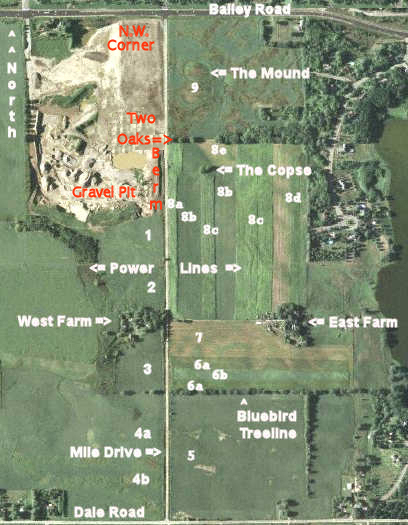
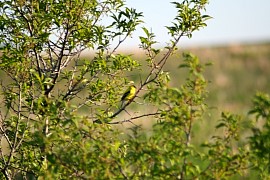 The American Goldfinch (Carduelis tristisis). Sorry, not the greatest picture (enlarge it).
In the summer male is bright yellow with a black cap whereas female is drab olive.
Sexes similar and drab in winter.
The American Goldfinch is one of the latest nesting birds. It usually
does not start until late
June or early July, when most other songbirds are finishing with breeding.
The late timing
may be related to the availability of suitable nesting materials and seeds for feeding young.
The American Goldfinch (Carduelis tristisis). Sorry, not the greatest picture (enlarge it).
In the summer male is bright yellow with a black cap whereas female is drab olive.
Sexes similar and drab in winter.
The American Goldfinch is one of the latest nesting birds. It usually
does not start until late
June or early July, when most other songbirds are finishing with breeding.
The late timing
may be related to the availability of suitable nesting materials and seeds for feeding young.
|
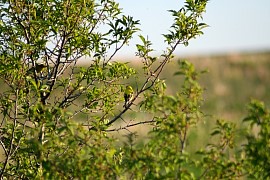 The American Goldfinch is mostly monogamous, but a number of females switch mates after producing
a first brood. The first male takes care of the fledglings while the female goes off to start
another brood with a different male.
The American Goldfinch is mostly monogamous, but a number of females switch mates after producing
a first brood. The first male takes care of the fledglings while the female goes off to start
another brood with a different male.
|
|
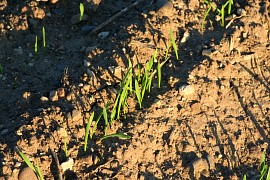
The barley is sprouting.
|

Gene is working in Field #6.
|
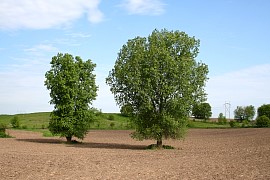
Here are the two trees across from Bluebird Treeline - they have finally fully leafed out.
|
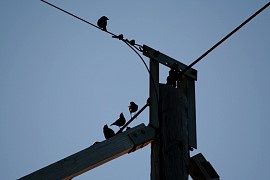
This may look like a poor photo - blackbirds on the power lines that run across the road - but enlarge
it and look at the sunset reflected off one of the birds, I like it.
|
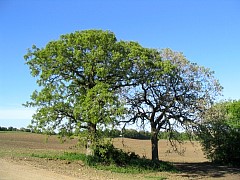
The two trees that I call Two Oaks - the eastern-most tree isn't filling out it's leaves as fast
as it's partner - maybe it's not as healthy ...
|
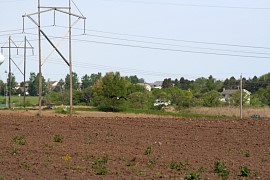
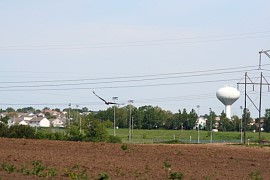
The bald eagle (Haliaeetus leucocephalus).
I encourage you to enlarge these pictures. As I walked down Bluebird Treeline to visit
the eagle nest, one of the eagles left the nest and flew in a circle in front of me.
At one time, the word "bald" meant "white," not hairless. Bald eagles are found over most of
North America, from Alaska and Canada to northern Mexico.
Both male and female adult bald eagles have a blackish-brown back and breast; a white head, neck,
and tail; and yellow feet and bill.
|
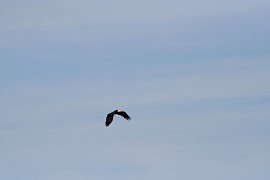
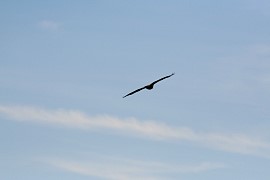
Wild bald eagles may live as long as thirty years, but the average lifespan is probably
about fifteen to twenty years.
Once paired, bald eagles remain together until one dies, the survivor will not hesitate
to accept a new mate.
All eagles are renowned for their excellent eyesight, and the bald eagle is no exception.
They have two foveae, or centers of focus, that allow the birds to see both forward and to
the side at the same time.
|
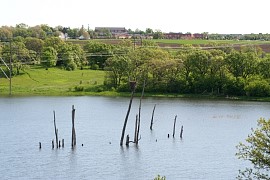
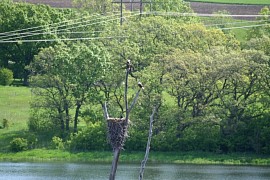
Here is the nest in Bailey Lake. On the picture on the right you can see both parents and
a juvenile in the nest.
Juvenile bald eagles are a mixture of brown and white; with a black bill in young birds. The adult
plumage develops when they're sexually mature, at about 4 or 5 years of age.
|
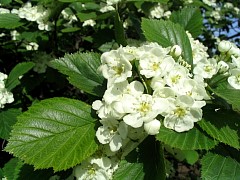
I believe these showy blossoms from a shrub in Bluebird Treeline belong to Juneberry
(Amelanchier alnifolia).
I am basing my identification by the white 5-petaled blossoms and the shape and pairing
of the toothed leaves.
Return to Flora
|
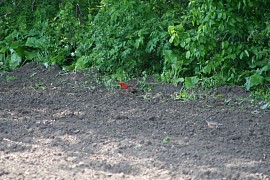
Northern Cardinal (Cardinalis cardinalis). You will have to enlarge the picture.
The bird's name comes from the red-robed Roman Catholic
Cardinals. Males are bright, deep red with black faces and red beaks. Females are lighter, with mostly
grayish-brown tones. Both possess prominent raised crests and strong beaks. The male sings in a loud,
clear whistle from a tree top to defend his territory, which he jealously guards. He will chase off
other males. The pair sometimes sing together before nesting and the male may feed his mate. The
female builds a cup nest in a well-concealed spot in dense shrub or a low tree. Both feed the young.
Return to Birds
|
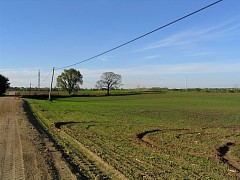
The barley in Field #7 continues to grow - the field is changing slowly from black to green.
|